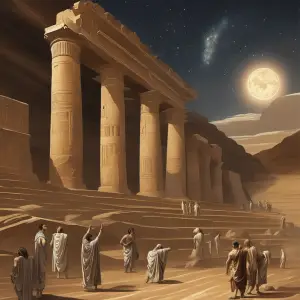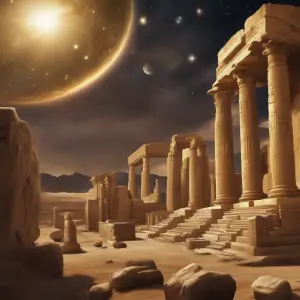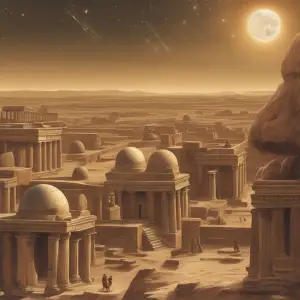What Practical Value Did Astronomy Offer to Ancient Civilizations?
Brace yourself for a cosmic journey back in time! From stargazing farmers to celestial architects, discover how ancient minds unlocked the secrets of the skies and revolutionized their world.
Get ready to embrace the wonders of the past and see how the stars aligned with ancient ingenuity!

Unraveling the Celestial Advancements of Ancient Civilizations
Ah, the stars! Those twinkling celestial wonders have mesmerized us for eons.
Discover Your FREE Personalized Moon Reading NowBut did you know that these dazzling lights in the night sky offered more than just beauty to our ancestors?
Ancient civilizations looked up and found more than just pretty constellations; they discovered practical value in the heavens above.
In this cosmic journey back in time, we’ll delve into the ingenious ways ancient minds harnessed astronomy to revolutionize their world.
Charting the Skies: Navigating with the Stars
Long before GPS and compasses, seafarers and travelers had a celestial navigator – the stars.
Ancient sailors looked up to find their way across vast oceans.
Discover Your FREE Personalized Moon Reading NowBy studying the positions of stars, they could determine their latitude and navigate treacherous waters with confidence.
From the Polynesians of the Pacific to the Vikings of the North Atlantic, astronomy was the secret to their successful journeys.
The Cosmic Farmers: Aligning with the Seasons
Imagine being an ancient farmer, toiling to cultivate your crops for survival.
How would you know when to plant and when to harvest? Enter astronomy!
By observing the movement of celestial bodies, early agricultural communities developed sophisticated calendars to track the seasons.
Discover Your FREE Personalized Moon Reading NowPlanting and harvesting became precise, maximizing yields and ensuring survival.
Architects of the Heavens: Monumental Alignments
Ever wondered how ancient civilizations erected massive structures with such precision?
Astronomy played a pivotal role! Remarkably, the Great Pyramids of Giza, Stonehenge, and many other iconic structures were aligned with celestial events.
The alignment with solstices and equinoxes not only showcased their astronomical knowledge but also served as sophisticated calendars and temples of celestial reverence.
Astronomical Timekeepers: Marking the Hours
Before the age of clocks, our ancestors had to keep time through innovative means.
Discover Your FREE Personalized Moon Reading NowEnter sundials – one of the earliest timekeeping devices known to humanity.
By observing the movement of the Sun’s shadow, ancient astronomers marked the passing hours.
From the majestic sundial of Ancient Rome to the ingenious Obelisks of Ancient Egypt, astronomy played a crucial role in measuring time.
The Healing Power of Celestial Bodies
Ancient civilizations believed that celestial bodies influenced human affairs.
Astrology, though controversial today, held a special place in their hearts.
Discover Your FREE Personalized Moon Reading NowFrom predicting auspicious times for important events to guiding medical practices, they believed that the positioning of celestial bodies held the key to their fate and well-being.
Unraveling the Universe: Philosophical Insights
Astronomy not only had practical applications but also stirred profound philosophical contemplations.
Ancient scholars looked at the heavens and pondered the nature of the universe, our place in it, and the existence of a higher power.
These cosmic musings laid the foundation for early philosophy, sparking curiosity about the cosmos that still drives us today.
Legacy of Ancient Astronomy: Paving the Way for Modern Science
The astronomical advancements made by ancient civilizations were not just isolated achievements; they were the building blocks of modern science.
Discover Your FREE Personalized Moon Reading NowObserving the heavens with wonder and curiosity, they laid the groundwork for the scientific method, astronomy, and physics, shaping the way we perceive and understand the universe today.

Related Article: Astrology Aspects Cheat Sheet: A Complete Guide
Eclipse Predictions: A Celestial Marvel
Ancient astronomers were keen observers of celestial events, including eclipses.
Discover Your FREE Personalized Moon Reading NowThey meticulously recorded the timings and patterns of solar and lunar eclipses, using this knowledge to predict future occurrences.
This predictive ability not only fascinated their societies but also played a role in cultural beliefs and rituals surrounding these awe-inspiring phenomena.
Astronomical Art and Mythology
The night sky served as a canvas for ancient civilizations to create myths and stories woven around celestial bodies.
Stars, planets, and constellations were anthropomorphized, becoming characters in captivating tales of love, valor, and tragedy.
These myths provided cultural identity and moral lessons, giving astronomy a profoundly artistic and imaginative dimension.
Discover Your FREE Personalized Moon Reading NowHarvesting Starlight: Astronomy in Agriculture
Beyond tracking seasons, ancient civilizations leveraged the moon and stars to optimize agricultural practices further.
By observing lunar cycles and using stellar calendars, they determined the best times for planting and irrigation, ensuring bountiful harvests.
Astronomy not only fed their curiosity but also filled their plates.
Ancient Astronomers as Mathematicians
Astronomy and mathematics went hand in hand in ancient times.
Astronomers made precise calculations of celestial movements, celestial distances, and planetary orbits.
Discover Your FREE Personalized Moon Reading NowThese complex mathematical analyses laid the foundation for early advancements in geometry and trigonometry, enriching ancient civilizations’ understanding of both the skies and the Earth.
Aligning with the Divine: Religious Significance
The heavens held religious significance for ancient civilizations.
Celestial bodies were associated with gods and goddesses, and temples were constructed in harmony with astronomical events.
Aligning religious ceremonies with celestial occurrences, they believed that they could gain divine favor and protection.
Celestial Navigation in Daily Life
Astronomy wasn’t confined to sailors and travelers alone; it seeped into daily life too.
Discover Your FREE Personalized Moon Reading NowAncient societies used stars as guides for determining the ideal times for hunting, fishing, and even for conducting important rituals.
They saw the sky as a vast celestial map, guiding them through the journey of life.
Stellar Legacy: Ancient Observatories
Evidence of ancient observatories scattered across the globe stands as a testament to their dedication to astronomy.
From Chankillo in Peru to the observatory at Goseck, Germany, these structures served as hubs for studying celestial phenomena.
The precision and knowledge embedded in these ancient observatories are awe-inspiring even by today’s standards.
Discover Your FREE Personalized Moon Reading NowCosmic Alignments in Art and Architecture
Astronomy also influenced the artistic and architectural achievements of ancient civilizations.
Temples, monuments, and even paintings often incorporated astronomical alignments.
These celestial connections added mystical depth to their artwork and demonstrated the harmonious relationship between the earthly and celestial realms.
Lunar Cycles and Human Cycles
The lunar cycle had a profound impact on the lives of ancient societies.
From guiding women’s menstrual cycles to influencing festivities and religious observances, the moon’s phases were deeply interwoven into various aspects of their lives, showcasing the pervasive influence of astronomy on culture.
Discover Your FREE Personalized Moon Reading NowAstronomy and Social Hierarchies
The study of astronomy was closely associated with power and knowledge.
Priests and scholars who possessed astronomical knowledge held high positions in ancient societies.
Their ability to predict celestial events and interpret omens granted them authority and respect, shaping the social hierarchies of their time.
The Legacy Continues: Modern Astronomical Heritage
The curiosity and fascination with the cosmos that began in ancient times continue to thrive today.
Modern astronomy builds upon the knowledge of our ancestors, using advanced technology to explore the universe beyond their wildest dreams.
Discover Your FREE Personalized Moon Reading NowOur fascination with the stars endures, driving us to seek answers to questions that have intrigued humanity since time immemorial.

Related Article: Grand Cross Astrology: Cosmic Transformation
FAQs About What Practical Value Did Astronomy Offer to Ancient Civilizations
How Did Ancient Civilizations Use Astronomy for Navigation?
Ancient civilizations relied on astronomy for navigation, especially during long sea voyages.
Discover Your FREE Personalized Moon Reading NowBy studying the positions of stars, they could determine their latitude, guiding them across vast oceans with precision.
What Role Did Astronomy Play in Agriculture for Ancient Societies?
Astronomy played a vital role in agriculture for ancient societies.
By observing celestial movements, they developed sophisticated calendars to track seasons, enabling precise timing for planting and harvesting, maximizing crop yields, and ensuring their survival.
How Did Ancient Civilizations Align Monuments with Celestial Events?
Ancient civilizations aligned monumental structures, like the Great Pyramids and Stonehenge, with celestial events such as solstices and equinoxes.
These alignments showcased their astronomical knowledge and served as sophisticated calendars and places of celestial reverence.
Discover Your FREE Personalized Moon Reading NowDid Astronomy Influence the Cultural and Religious Beliefs of Ancient Societies?
Yes, astronomy profoundly influenced the cultural and religious beliefs of ancient societies.
Celestial bodies were associated with gods and goddesses, and religious ceremonies were aligned with celestial occurrences.
Ancient people believed that observing celestial events could gain divine favor and protection.
In What Ways Did Ancient Civilizations Use Astronomy for Timekeeping?
Ancient astronomers used sundials and other methods to keep time before the invention of clocks.
Sundials, using the Sun’s shadow, marked the passing hours, and astronomical observations aided in devising various timekeeping mechanisms, enhancing daily life and societal organization.
Discover Your FREE Personalized Moon Reading NowFinal Thought About What Practical Value Did Astronomy Offer to Ancient Civilizations
Astronomy offered ancient civilizations more than just a glimpse into the night sky; it unlocked a realm of practical knowledge and ingenuity.
From celestial navigation that guided their journeys to precise timekeeping methods that structured their daily lives, astronomy played a crucial role in their survival and progress.
The alignment of monumental structures showcased their deep understanding of the cosmos and their spiritual beliefs.
Moreover, their astronomical observations laid the foundation for modern science, shaping the way we perceive and explore the universe today.
As we gaze at the stars, we pay homage to those visionary ancient minds and their enduring legacy on humanity’s cosmic journey.
Discover Your FREE Personalized Moon Reading Now